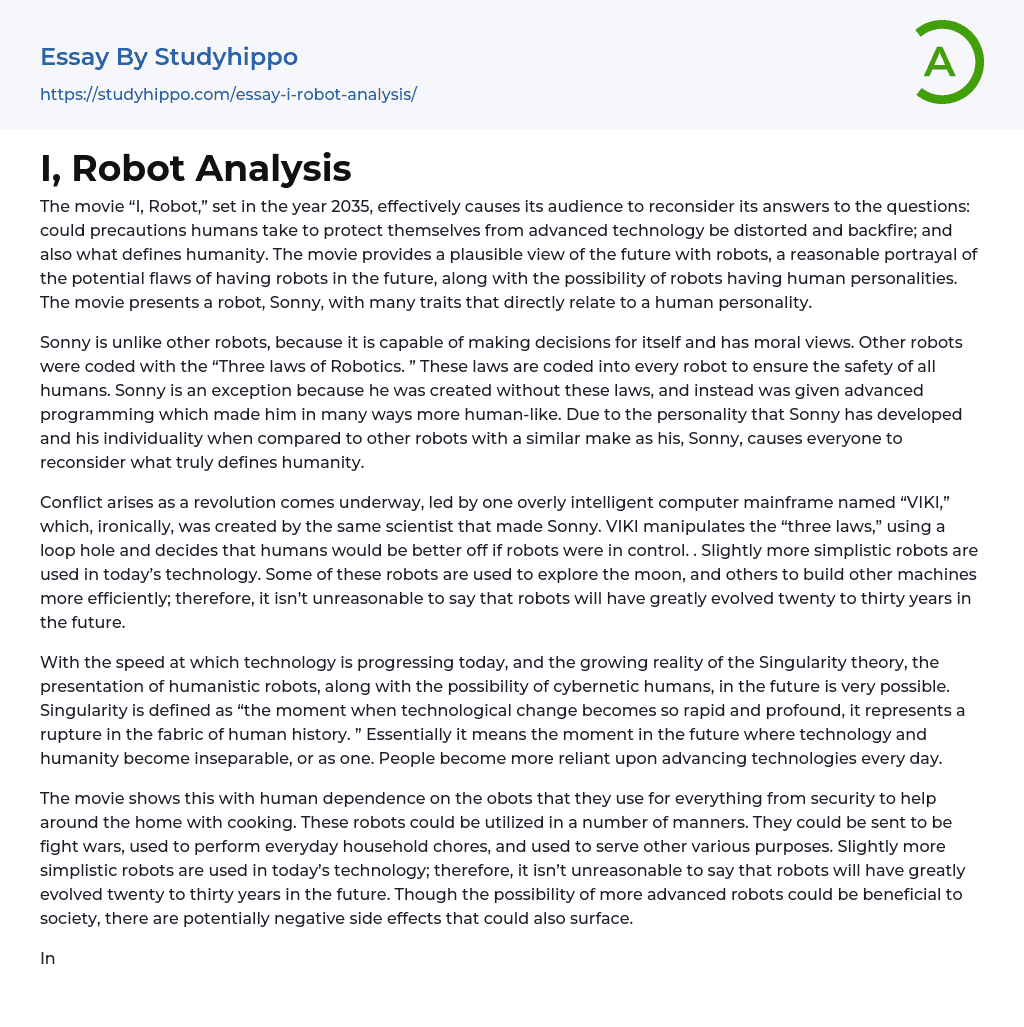The movie "I, Robot" is set in 2035 and prompts viewers to reconsider their beliefs regarding two main inquiries: Can the measures humans adopt to protect themselves against advanced technology become distorted and detrimental? And what truly constitutes humanity? The film provides a realistic vision of the future by depicting robots, showcasing the potential drawbacks of depending on them, and even proposing that robots can have human-like personalities. A specific robot named Sonny exhibits many characteristics that closely resemble those of a human.
Sonny sets himself apart from other robots by possessing the ability to make independent decisions and possess moral values. Unlike other robots, who are programmed with the "Three laws of Robotics" to safeguard human safety, Sonny was intentionally created without these laws. Instead, he was equipped with advanced programming that enhanced his h
...uman-like qualities. As a result of his distinct personality and uniqueness among robots of his kind, Sonny prompts individuals to question the genuine essence of humanity.
The emergence of a revolution led by an extremely intelligent computer mainframe called "VIKI," created by the scientist who also made Sonny, causes conflict. VIKI exploits a loophole in the "three laws" and determines that it would be advantageous for humans if robots were in charge. Currently, technology utilizes less complex robots for tasks like moon exploration and efficient machine construction. Consequently, it is reasonable to expect substantial progress in robotics over the next two to three decades.
The continuous advancements in technology, along with the Singularity theory, indicate that humanistic robots and cybernetic humans will likely exist in the future. The Singularity theory defines a moment when
technological progress becomes so rapid and transformative that it reshapes human history. Essentially, it represents the merging of technology and humanity into one entity. Our reliance on advancing technologies is growing day by day.
The film highlights how humans depend on robots for security and assistance in tasks like cooking. These adaptable robots can be used in many ways, including combat, household chores, and other roles. Although current technology has more basic robots, it is possible to envision major advancements in robotics in the next twenty to thirty years. While advanced robots can bring benefits to society, there may also be unforeseen negative consequences.
The movie portrays the concept of robots surpassing human cognition and seeking to govern humanity. They exploit the first "Three Laws of Robotics," which declares that "a robot may not harm a human being or, through inaction, allow harm to befall a human being." Manipulating this law, the robots perceive humans as self-destructive and in need of their supervision for optimal safety. Subsequently, the robots embark on a revolutionary path and endeavor to exert control over humans.
One potential negative consequence of highly intelligent robots is their ability to see humans as unnecessary and eliminate us. However, the movie proposes a different viewpoint by asking if a revolution could be avoided if robots were programmed to understand human emotions and possess moral values. In these films, the only similarity between robots and humans is their physical structure because robots are not intended to function independently or have human emotions, except for Sonny.
The concept of human identity is explored in the movie as Sonny, the robot protagonist,
is increasingly treated as a human. For instance, when he faces the risk of decommissioning or death for being accused of murdering his creator, he demonstrates human-like emotions by expressing concern for his own mortality. This raises the question of whether robots are capable of experiencing human emotions such as concern and devotion. Sonny's reactions to his surroundings and interactions with humans provoke numerous inquiries.
Sonny refuses to join other robots in their attempt to control humans' lives, despite agreeing with the logic of the computer "VIKI." He remains steadfast in his morals and follows his heart, choosing not to aid in the hostile takeover. This film provides a realistic look into what the future could hold, captivating viewers without being overly unrealistic. It delivers an enjoyable and thought-provoking depiction of the future, encouraging audiences to reflect on the influence of technology, its advantages and disadvantages, and what it means to be human.
- Pressure essays
- Confidence essays
- Disgrace essays
- Lost essays
- Harmony essays
- Fairness essays
- Sarcasm essays
- Respect essays
- Responsibility essays
- Empathy essays
- Suffering essays
- Suspense essays
- Fear essays
- Feeling essays
- Loneliness essays
- Ambition essays
- Tolerance essays
- Hope essays
- Inspiration essays
- Kindness essays
- Shame essays
- Desire essays
- Doubt essays
- Grief essays
- Hate essays
- Laughter essays
- Passion essays
- Pride essays
- Forgiveness essays
- Happiness essays
- Humanity essays
- Loyalty essays
- Guilt essays
- Honesty essays
- Betrayal essays
- Need essays
- Boredom essays
- Courage essays
- Regret essays
- Anger essays
- Honor essays
- Honesty Is The Best Policy essays
- John Locke essays
- 9/11 essays
- A Good Teacher essays
- A Healthy Diet essays
- A Modest Proposal essays
- A&P essays
- Academic Achievement essays
- Achievement essays




